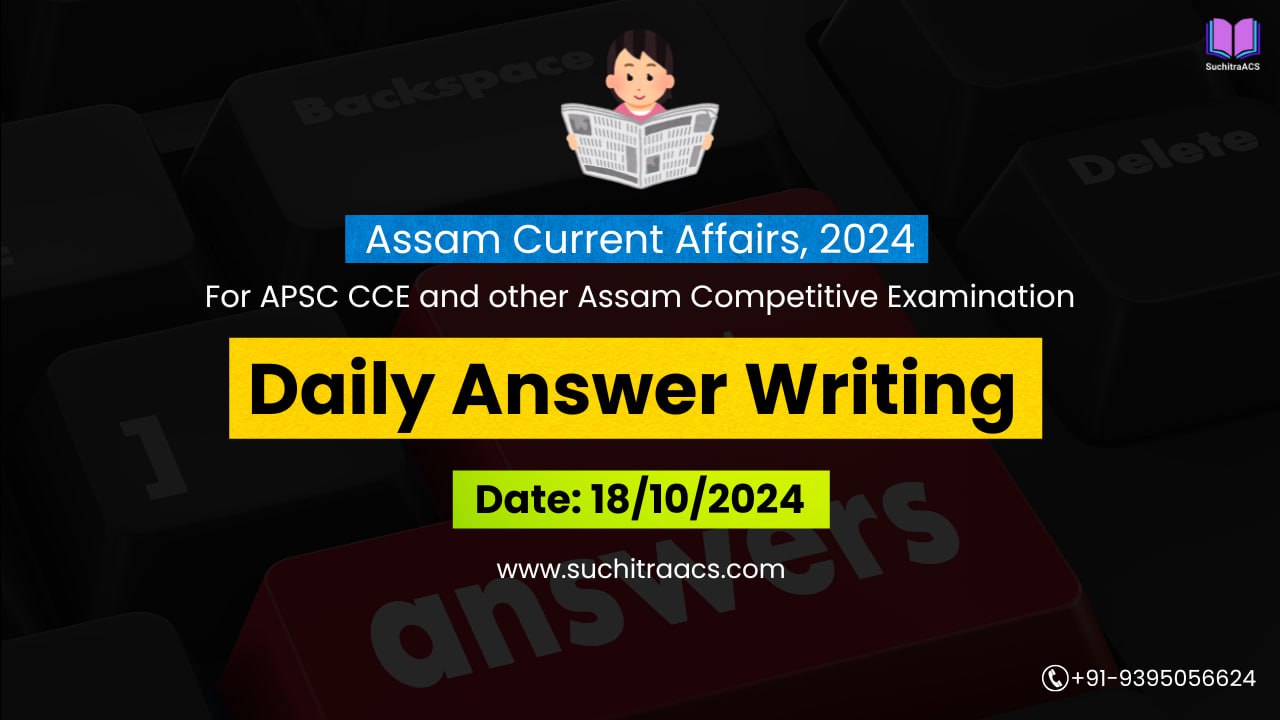APSC Answer Writing (Daily) based on Assam Tribune – 18/10/2024
For APSC CCE and other Assam Competitive examinations aspirants, practicing Daily Answer Writing is vital. This blog covers the most important Main question and its model Answer from the Assam Tribune today (18-10-2024).
Q. The Supreme Court’s verdict on Section 6A of the Citizenship Act, 1955, has significant implications for the socio-political landscape of Assam. Critically analyze the impact of the verdict on the Assam Accord, internal security, and demographic balance in the state. Also, suggest measures to ensure balanced implementation while addressing concerns related to national security and indigenous rights. (250 words)
Model Answer:
Introduction:
The Supreme Court recently upheld the constitutional validity of Section 6A of the Citizenship Act, 1955, which stems from the Assam Accord of 1985. The provision grants citizenship to immigrants from Bangladesh who entered Assam before March 25, 1971. The verdict has stirred discussions on its impact on Assam’s demographic composition, internal security, and the broader implications for the region.
Body:
Impact on Assam Accord and Demographic Balance:
- Reaffirmation of Assam Accord’s Principles:
- The verdict upholds the 1971 cut-off date, reinforcing the commitment to the terms of the Assam Accord, aimed at preserving Assam’s demographic integrity.
- Concerns Over Cultural Preservation:
- Indigenous communities fear that recognizing a large number of immigrants may alter Assam’s cultural identity and language demographics.
- Implications for Political Dynamics:
- The judgment has a direct impact on voter demographics in the state, influencing local politics and potentially altering electoral outcomes.
Impact on Internal Security:
- Potential for Social Unrest:
- The issue of citizenship and recognition of immigrants remains sensitive, with a risk of agitations from groups advocating for indigenous rights.
- Challenges of Monitoring Illegal Immigration:
- Despite legal provisions, porous borders with Bangladesh continue to pose a challenge, leading to potential issues of unauthorized entry.
Measures for Balanced Implementation:
- Strengthening Border Management:
- Investing in advanced surveillance technology and increasing patrols along the India-Bangladesh border can prevent further illegal immigration.
- Engagement with Bangladesh:
- Diplomatic talks with Bangladesh can enhance cooperation in managing cross-border migration and repatriation processes.
- Digital Record-Keeping of Citizens:
- Developing a digital and transparent database of citizens can streamline identification and ensure efficient implementation of the law.
- Community Awareness and Dialogue:
- Engaging with local communities through awareness campaigns can help address their concerns and ensure smoother implementation of the verdict.
- Balancing CAA Provisions with Section 6A:
- Clarifying the application of the Citizenship Amendment Act (CAA) in Assam is crucial to avoid contradictions with Section 6A and maintain harmony.
Conclusion:
The Supreme Court’s verdict on Section 6A holds critical implications for Assam’s socio-political landscape, presenting opportunities to address historical grievances while posing challenges to demographic stability. A balanced approach, focusing on effective implementation and inclusive dialogue, is essential for safeguarding both national security and the rights of Assam’s indigenous communities.
✨ Looking for top-quality APSC online coaching at an affordable price?

🔔 Join Our WhatsApp Study Group!
For exclusive access to premium quality content, including study materials, current affairs, MCQs, and model answers for APSC CCE and other Assam competitive exams.
Click here to join: SuchitraACS Study WhatsApp Group
📚 Want to know more about SuchitraACS’s most affordable courses?
Click here to know more: SuchitraACS Courses for APSC CCE and Assam Competitive Examinations




